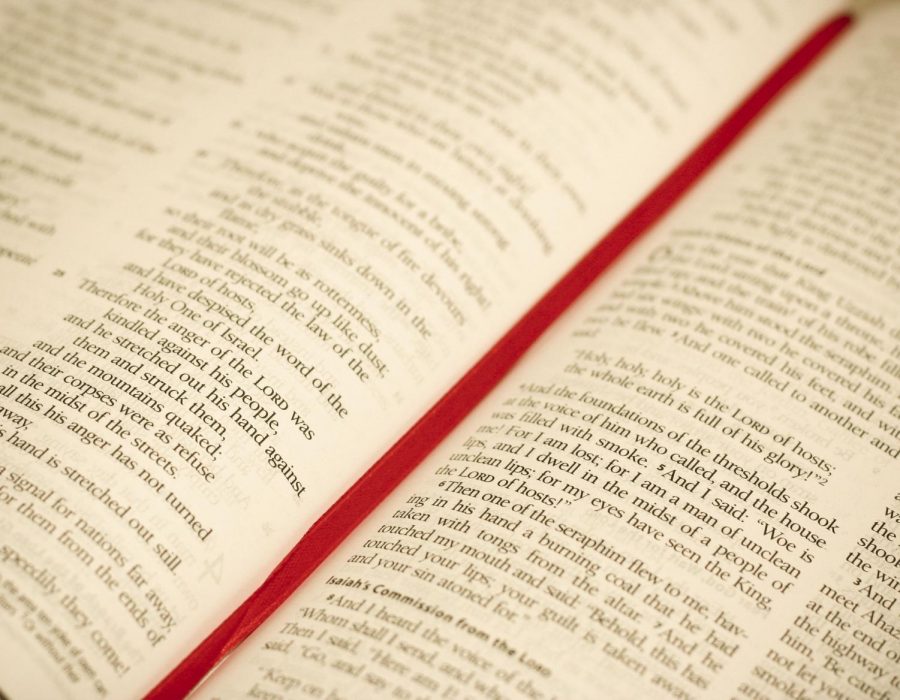Christianity in classrooms?
House File 2031 would allow for elective classes on the subject of the Bible and its various books to be taught in public high schools in Iowa.
Feb 15, 2018
On Feb. 6, House File 2031 passed through a subcommittee and is moving on to be considered by the education committee. If signed into law, the bill would create an elective course on Bible literacy for public high schools in Iowa.
HF 2031 proposes a class on the Hebrew scriptures, a class on the New Testament and a class on the Hebrew Scriptures and New Testament. These courses are meant to help students use the Bible to better understand “contemporary society and culture, including but not limited to literature, art, music, mores, oratory and public policy.” The course will teach about the contents of the Bible, as well as its history, literary style and influence.
“Teaching the Bible as a historical document is super relevant, I think,” said Dr. Michael Graziano of the Department of Philosophy and World Religions. “I think it would be fine to have a class on religious texts in America or something like that, if the school wanted to offer that, and you could talk about how different religious ideas have played a role in American history. But the only issue with offering a class exclusively on Christianity would be that you would then have to be open to having a class that offered coverage to other groups.”
This Bible-based class would not be the only one in existence. In 2017, a very similar curriculum was approved by Kentucky. Just last month, the American Civil Liberties Union of Kentucky sent a letter to the state’s Department of Education, claiming that the course violated the Constitution, according to the Courier Journal.
For some future educators like Zach Archer, a senior music education major, the bill poses some concerns.
“We don’t have a set religion in our country,” Archer said. “And the Founding Fathers themselves said that religion does not have a place within government in any case, even if it may be influenced by the religious practices at the time. The Puritans came over because they were being persecuted in England, so it doesn’t make sense to build a country that has that history of persecution and then say, ‘Nope, we’re only going to say this one and the rest of you don’t really matter.’”
Other future educators like Jessica Sholes, a sophomore early childhood education major, have more mixed feelings about the bill.
“I’m a devout Christian,” Sholes said. “Initially, I think it’s wonderful. However, the public-school thing catches me just because once I went from my [private] Lutheran school to a public school — day and night difference. It was a very different setting, very different curriculum. I do think it’s a good idea, but I just know how strict they are.”
HF 2031 stipulates that such a course is not allowed to “endorse, favor, promote, or disfavor, or be hostile toward, any particular religion, faith, or nonreligious perspective.”
The possible violation of the separation of church and state is not the only problem Archer sees with the bill.
“If it’s public schools that are having this, especially in schools where there’s a ton of diversity, you’re secluding so many of those students,” Archer said. “I wouldn’t want to teach in that school that’s being that segregated with what it teaches and what its values are.”
Sholes shared a similar sentiment.
“Not everyone is a Christian, so only having that option in a school of hundreds of diverse people, it would almost become biased,” Sholes said. “If you only put one religion into a very diverse and populated school district, it could cause a lot of problems.”
“If someone were to teach it in good faith and not to use it as a venue to try to promote their own religious ideas or something — assuming none of that is happening, I think it could be useful,” Graziano said. “On one hand, it’s definitely a part of American heritage, Western heritage — Christianity’s a big part of that for sure. That can be an interesting historical lesson. That can be an interesting thing to learn about. But I think the only concern would be that it’s sort of odd that the only classes proposed are only with Christianity.”
Right now, Representatives Walt Rogers of Cedar Falls and Amy Sinclair of Allerton are not prioritizing the bill. Instead, they have shifted their focuses to supporting House Study Bill 531, which would require high school students to pass a civics test before graduating high school. The test would be the same one administered by citizenship and immigration services. HSB 531 was recommended passage on Feb. 7.
House File 2031 needs to be approved by the Education Committee before Feb. 16 to be considered for this year’s Legislature. So far, the bill has yet to appear on the Education Committee’s agenda.













